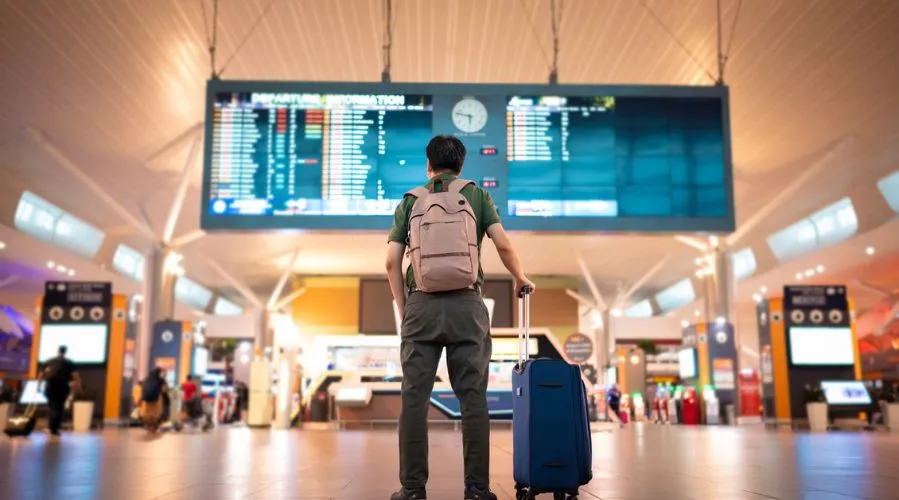Travel Insurance is mandatory to obtain a Schengen visa
Written by the AXA Schengen team
Date: 07/15/2025
Land or Sea, History or Luxury, Malta and its multiple cultural influences offer all sorts of pleasures to its visitors. In the mood to set sail for Gozo and Comino islands, to stop your sailboat (or yacht!) in the Marina di Valletta and go crazy in one of the Maltese casinos before reconnecting with the past in the medieval streets of Mdina, Malta’s former capital city, or in Rabat’s Christian catacombs dating back to the 3rd century BC? Very well!
But beware! To be allowed in this 316 km² paradise, considered as one of the safest destinations in Europe, you might need to hold a visa for Malta.
Wait! Don’t throw your sword away just yet! Once again, the AXA team has prepared a detailed and easy guide to help you through the visa for Malta application Crusade.
Put on your shining armour and let’s start reading!
-
Do you need a visa to visit Malta?
-
Where must you apply for your visa for Malta?
-
When should you apply for your visa for Malta?
-
What type of visa do you need to visit Malta?
-
How much does a Schengen visa for Malta cost?
-
What documents must be enclosed with your visa for Malta application?
-
The 10 steps of the visa for Malta application process
-
Why is AXA the best choice for all cautious travellers?
Do I need a visa to travel to Malta?
A few essential facts first:
- The need for a visa to enter Malta depends on the traveller’s nationality as well as how long they intend on staying.
- Malta is part of the Schengen area.
As such, it applies the European Union’s common policy when it comes to short-stay visas (less than 90 days). This implies that the issuing criteria and the rights granted by the said visa are identical from one Schengen State to another. - However, when it comes to granting long-stay visas (more than 90 days), each Schengen state, including Malta, applies its own national policy.
Who doesn’t need a visa to travel to Malta?
If you fit into one of the following categories, you don’t need to apply for a visa to discover Malta and its wonders. But remember, subscribing to travel insurance is still highly recommended to make sure you and your loved ones are protected in case of unexpected (and unpleasant!) events.
Travellers exempt from visa requirements:
- Citizens of Schengen States or the European Union as well as family members living with them,
- Third-country nationals, holders of a valid residence permit granted by a Schengen country,
- Nationals of third-countries which have signed a visa waiver agreement with the European Union such as the United Kingdom, Japan, Israel and Canada.
A word of caution!
While these specific third-country visitors don’t need a visa to visit Malta, they must still comply with several requirements:
- Their stay must not exceed 90 days over a 180-day period.
- They must travel with proper ID documentation i.e. a passport issued less than 10 years prior to their trip and valid more than 3 months after their scheduled date of departure from the Schengen area.
- Starting the last quarter of 2026, they will need to apply online for an electronic travel authorisation (ETIAS) to enter the Schengen area.
Who needs a visa to travel to Malta?
All other travellers need a visa to visit Malta.
If you aren’t quite sure if this applies to your situation, refer to the list of about one hundred countries whose citizens are required to obtain a visa to enter the Schengen area.
It includes Bangladesh, Botswana, China, Cuba, Egypt, India, Russia, Thailand, Vietnam and Zimbabwe.
Where must you apply for your visa for Malta?
Depending on your place of residence, different situations can occur:
- In countries where Malta has diplomatic representation (i.e. embassies, consulates)
→ You will need to submit your visa for Malta application file at the consular services attached to your place of residence. They will examine your file and decide to grant or deny your visa request.
- In countries where Malta has no diplomatic representation
Depending on your place of residence, 2 alternatives are possible:
1. In compliance with the EU Visa Code, Maltese authorities have entrusted another Schengen country with the responsibility of handling the entire visa for Mata application process, from receiving the files to decision-making.
→ You will thus need to submit your visa for Malta application file at the consular services of this other Schengen country.
2. The Maltese authorities have commissioned their official partner, VFS Global, to handle certain aspects of the visa for Malta application process. This specialised private company is in charge of informing applicants, recovering their application files during the visa appointments and tracking the progress of the examination of their file.
→ You will submit your visa for Malta application file at one of these officially commissioned visa centres.
Our AXA TIP: Make sure to check the list of certified visa centres authorised to handle visa for Malta applications.
Good to know!
A visa centre acts only as an intermediary.
Its role is to transfer visa application files to the official Maltese consular services as they are the only ones authorized to examine your visa request and decide to grant or deny a visa.
When should you apply for your visa for Malta?
To avoid any organisational mishaps in your visa for Malta application process, make sure to establish a timeline based on the following information:
- For a short-stay (type C) visa for Malta, your visa application can be submitted 6 months at the earliest and 15 days at the latest prior to your scheduled date of departure.
- Processing time is usually 15 calendar days.
- Beware! Processing time can be longer, reaching 45 days, in some situations:
- During certain times of the year when the number of applications skyrise. Bear that in mind particularly when planning a summer trip, Malta is a very popular destination for tourists.
- If the Maltese consular services need to carry out further verifications or request additional documents.
- If Maltese authorities need to consult the other Schengen States to make sure they are not opposed to a candidate obtaining a visa. This measure systematically applies to nationals of certain third countries.
► The AXA team recommends:
→ Booking your appointment to submit your visa application file as soon as possible. Finding an available date can sometimes be more difficult than you imagine, delaying the whole examination process by several weeks. Particularly in some countries and times of the year (school holidays, bank holidays…).
→ Submit your application minimum 6 to 8 weeks prior to your scheduled date of departure. This will avoid additional and unnecessary stress in case of setbacks.
What type of visa do you need to visit Malta?
Now that we’ve found out more about where and when, it is time to determine what type of visa you need for your trip to Malta which is, remember, a Schengen Member State.
There are three main types of visas to enter the Maltese island.
The one you need depends on the duration and purpose of your stay.
The Schengen short-stay visa for Malta
Also called the type C visa or tourist visa, the Schengen visa allows visitors to stay up to 3 months in Malta and in all the other countries part of the Schengen area.
It is granted to applicants travelling for the most common purposes such as:
- Tourism,
- Business trips,
- Visiting family or friends,
- short internships and training courses,
- attending professional, cultural or sports events.
Beware!
The Schengen visa does not grant its holder the right to work in Malta.
If you wish to do so, even for less than 3 months, you will need to apply for a work permit.
Bonus info: The Schengen visa (or short-stay, type C, uniform visa) is the most frequently requested visa by travellers to Malta and the other Schengen states.
The national long-stay visa for Malta
The type D visa is issued for stays longer than 3 months (90 days).
It is compulsory for all third-country nationals, including those who don’t need a short-stay visa (or Schengen visa).
It applies for travellers wishing to stay in Malta to work, study or be reunited with their family already living in the country (in the context of family reunification).
Long-stay visas are called “national visas” as their issuing criteria are not standardized between European countries. Each Schengen State is free to determine its own requirements to grant them.
PRO TIP: for more details concerning the long-stay visa for Malta application process, you can visit the official Maltese administration website, Indentità where you will find the complete list of national visas as well as helpful links.
The Airport Transit Visa for Malta (the ATV)
There is a third type of visa, lesser known but essential for some travellers: the Airport Transit Visa.
Also known as the type A visa, it allows its holder to stay in the international area of Malta’s International Airport while waiting for a connecting flight.
It does not, however, grant the right to enter Maltese territory.
The ATV is compulsory for certain third-country travellers flying from and to a country located outside of the Schengen area.
To find out if this requirement applies to you, read our detailed guide on the type A, Airport Transit Visa.
How much does a Schengen visa for Malta cost?
Visa fees, collected by the Maltese government, cover the expenses entailed by the processing of your visa application.
The price of a Schengen visa (or visa fee) for Malta, depends mainly on the age of the applicant:
- Travellers aged 12 and over: full fee
- Children between ages 6 to 12: reduced fee
- Children younger than 6: free of charge
AXA Tip: To find out more, read our article detailing the costs entailed by a Schengen visa application.
Good to know:
● Depending on the purpose of their trip (studies, research, humanitarian work, etc.), some travellers can enjoy a reduced visa fee or even visa fee exemption.
● If you have to submit your visa for Malta application via a VFS Global Centre, you will have to pay additional service fees to this company.
● These different visa fees are non-refundable even if your visa application is denied.
What documents must be enclosed with your visa for Malta application?
The following list is not exhaustive but presents the most common documents which must be enclosed with your visa for Malta application.
More detailed and individualized information concerning these supporting documents will be provided by the Maltese consular services once you’ve completed your application form online.
Make sure to enclose all the mandatory documents required in your visa application file. Otherwise your application will be denied.
Documents mandatory for all visa applicants
- The application form completed, dated and signed.
- A valid passport.
- An ICAO ID picture meeting international standards.
- A travel insurance certificate.
More specific supporting documents
These documents specify and/or justify:
- The purpose of your stay.
- Your accommodation arrangements during your stay in Malta.
- Your ability to cover your financial needs during your stay.
- Proof of your intent on leaving the Schengen area at the end of your trip.
- Maltese authorities often demand a declaration of proof (you can download the form here) which must be completed by your host living in Malta or the person in charge of providing for you during your stay (such as a sponsorship letter.
Important!
● All documents must be in English.
The 10 steps of the visa for Malta application process
1. Check that your passport meets the official requirements to obtain your visa:
- Issued less than 10 years ago.
- Valid more than 3 months after the scheduled date of the end of your trip.
- Must include 2 blank pages
Good to know: if you don’t own a passport, check what other travel documents are accepted by the European Union with your Schengen visa application.
2. Find out what type of visa you need and where you should apply.
3. You will need to fill out an application form online OR download it before filling it out manually.
4. Book your appointment to submit your file.
5. Subscribe to certified and compulsory travel insurance:
-
- In compliance with article 15 of the EU visa Code, all visa applicants must subscribe to travel insurance. Otherwise, the visa request will be denied.
- It must meet several criteria detailed in our article on Schengen travel insurance.
6. Gather the required supporting documents.
7. Attend your appointment in person to submit your application file which must include:
- The letter confirming your appointment,
- The printed application form duly completed, dated and signed,
- Your passport,
- The required supporting documents (originals and copies),
- The accepted means of payment to settle the visa fees and service fees when applicable.
8. The day of your appointment, you will meet with a visa agent who will:
- check that your file is complete and that your supporting documents comply with visa requirements.
- record your biometric data (fingerprints and photo). Children under age 12 are exempt but must still attend the appointment.
- collect the visa and service fees.
- keep your passport.
9. Track online the progress of the examination of your visa application.
10. Once your application has been examined, you will be informed by text/email/phone and asked to come recover your passport.
→ If your visa is granted, a visa sticker will feature on your passport.
→ If your visa is denied, a document will be enclosed, explaining the reasons why and how you can appeal a visa refusal decision.
Why is AXA the best choice for all cautious travellers?
AXA Schengen travel insurance is certified by the consular services of all Schengen countries and is thus systematically accepted with visa for Malta applications.
Our Travel insurance for Malta offers many additional advantages:
● Quick and easy online subscription. Once it is completed, your travel insurance certificate is immediately sent to you via email, allowing you to enclose it with the other compulsory documents of your visa for Malta application file.
● Excellent value for money and decreasing rate based on the length of your stay.
● Refundable if your visa application is denied.
● A zero-deductible policy. 100 % expenses are reimbursed.
● No age limit.
● Free 24/7 medical consultation and assistance.
And even more coverage!
Don’t leave without us!
To find out which AXA option is the best suited to your needs and budget, discover and compare our different Schengen travel insurance plans.
Get your commitment-free, online quote now!
Related Articles
- Everything you need to know about Europe and the Schengen Area
- 7 European tourist attractions to avoid and what to do instead
- Tips to travel safely in Europe
FAQ
My son is going on a language training course in Malta, does he need a visa?
If you and your son are citizens of a country which has not signed a visa-waiver agreement with the EU, you will both need a visa to be allowed in Malta.
For language training courses shorter than 3 months, he will need to apply for a type C Schengen visa.
I am going on a Mediterranean cruise which might make a stop in Malta. Do I need a visa?
If your nationality is submitted to visa obligations to travel to Europe and moreover a Schengen country, then yes, you will need to apply for a visa to visit Malta which is part of the Schengen area. If you don’t intend on staying on land longer than 90 days (over a 180-day period), you can apply for a Schengen visa.
What are the official languages in Malta?
Malta has 2 official languages, Maltese and English, spoken everywhere on the archipelago. Italian is also understood by a wide part of the population. And while the Napoleonic occupation of 1798-1800 led to the abolition of slavery and the end of the Inquisition on the island, French is hardly spoken in this Mediterranean country.
AXA already looks after millions of people around the world
With our travel insurance we can take great care of you too
AXA Schengen's Travel Insurances

AXA Schengen Basic
AXA Schengen Basic is perfect to obtain your Schengen visa. This travel insurance meets all the requirements demanded, covers you in all the countries of the Schengen Area as well as 4 European microstates (Andorra, Vatican City, Monaco and San Marino).

AXA Schengen Essential
AXA Essential is perfect to obtain your Schengen visa. It provides coverage in all the Schengen countries + the European microstates + all the EU countries (including UK, Cyprus and the Republic of Ireland). And you get additional guarantees compared to AXA Schengen Basic.

AXA Schengen Annual
AXA Annual is perfect to obtain your Schengen visa. This annual travel insurance is ideal for those who often travel to Europe as well as multiple-entry Schengen visa holders. You get the same guarantees as AXA Schengen Annual for different countries during 90 days.


